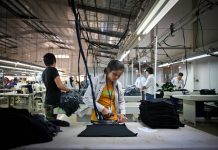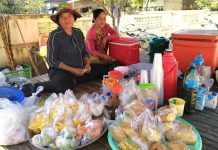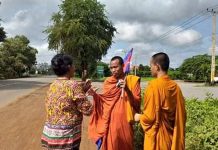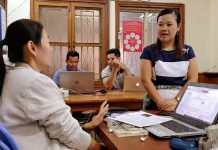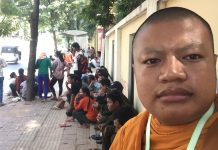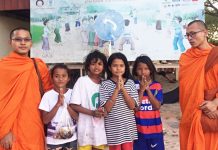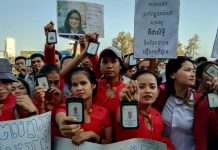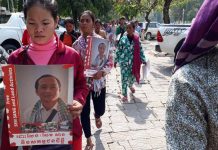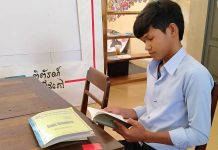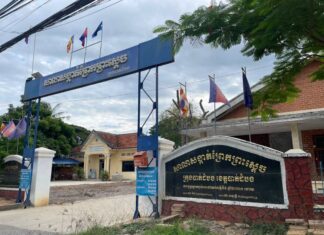Filmmakers Yearn for Cambodia’s Industry to Reach Its Potential
Cambodian filmmakers say they believe in the industry’s potential — film can reflect the values of society, and expand the boundaries of culture both emotionally and intellectually. Low costs in the country could even attract foreign productions to shoot here.
តំណាងសហជីព និងកម្មករ ជំទាស់វិសោធនកម្មច្បាប់ការងារ កាត់បន្ថយប្រាក់ឈ្នួលវេនយប់
តំណាងសហជីពការងារ និងកម្មករធ្វើការវេនយប់ សម្តែងការព្រួយបារម្ភពីការបាត់បង់អត្ថប្រយោជន៍ នៅពេលដែលក្រសួងការងារ ធ្វើវិសោធនកម្មច្បាប់ស្តីពីការងារ ដែលកាត់បន្ថយប្រាក់ឈ្នួលវេនយប់ពី ១៣០ភាគរយ មកត្រឹម១០០ភាគរយវិញ។
After My First Article Got Some Success…
My first article was tough but got a pretty good result — the hard work paid off.
នាយកសាលា អនុវត្តបំរាមលក់ចំណី៦ប្រភេទ តែអ្នកលក់បារម្ភបាត់បង់ចំណូល
យុទ្ធនាការ ហាមលក់ចំណីអាហារមួយចំនួន ក្នុងសាលារៀន ដែលធ្វើឲ្យប៉ះពាល់ដល់ សុខភាព របស់សិស្សានុសិស្ស ត្រូវបានអនុវត្ត ដល់សាលានៅតាម បណ្តាខេត្តនានា ប៉ុន្តែអ្នកលក់ដូរបារម្ភបាត់បង់ចំណូលប្រចាំថ្ងៃ។
អាជ្ញាធររឹតត្បិតព្រះសង្ឃចូលរួមសកម្មភាពតវ៉ា
ព្រះគ្រូសូត្រស្ដាំ គង់នៅវត្ដដំរីស ត្រូវបាន មន្ត្រីនៃមន្ទីរធម្មការ និងសាសនា ខេត្ដបាត់ដំបង និមន្តសាកសួរ បន្ទាប់ពីមាន ព្រះសង្ឃមួយអង្គ ដែលគង់នៅវត្តនេះ ចូលរួមធម្មយាត្រា ជាមួយសកម្មជន អង្គការមាតាធម្មជាតិ ទៅកាន់ខេត្តព្រះសីហនុ ដើម្បីទាមទារ អាជ្ញាធររុះរើសំណង់ខុសច្បាប់។
បទពិសោធន៍ នៃការយកព័ត៌មាននៅខាងក្រៅ
ខ្ញុំបាទឈ្មោះ យី សារ៉ាត់។ នៅសប្តាហ៍ទី៤នេះ ខ្ញុំបានចេញទៅ យកព័ត៌មាន អំពីការធ្វើកូដកម្ម របស់បុគ្គលិក ណាហ្គាវើលដ៍។ យកព័ត៌មាន នៅខាងក្រៅ បានធ្វើឲ្យ ខ្ញុំស្គាល់ ពីរបៀបធ្វើ ព័ត៌មាននៅខាងក្រៅ ស្គាល់បងៗអ្នកសារព័ត៍មាន និងដឹងពីសកម្មភាព ជាក់ស្ដែងរបស់រឿង។
Interviewing High-Ranking Government Officials… Was a Pleasant Experience
This week I experienced something different from the previous week as usually I interview normal people, monks, etc., but this week I interviewed high-ranking officials in government such as H.E. Mr. Chin Malin, spokesman of Ministry of Justice, H.E. Mr. Kim Santepheap, spokesman of the Ministry of Justice and H.E. Mr. Seng Sok Mony, spokesman of the Ministry of Cult and Religions.
Me and 2020
Before you read this, let me take a minute of silence to mourn for all the things I set in 2019, which I should have done in 2018 because I made a promise to myself since 2017; you can also do the same for all the bad things you want to let go.
បញ្ហាជួបប្រទះ នៃការប្រមូលព័ត៌មាន នៅខាងក្រៅ
សប្ដាហ៍នេះ ខ្ញុំទទួលបាន បទពិសោធន៍ថ្មី ជាច្រើន អំពីការចុះទៅសម្ភារសន៍ព្រឹត្តិការណ៍មួយ ដែលប្រជាសហគមន៍ មកពីខេត្តស្វាយរៀង និងខេត្តត្បូងឃ្មុំ។
ជំហានទី៤ របស់ខ្ញុំឆ្ពោះទៅរកភាពជា អ្នកសារព័ត៌មាន
នេះជាសប្ដាហ៍ទីបួន ហើយនៃការចូលរួមរបស់ខ្ញុំ ជាមួយវគ្គបណ្ដុះបណ្ដាលក្នុងការសរសេរសារព័ត៌មាន ដែលរៀបចំឡើងដោយ មជ្ឍមណ្ឌលកម្ពុជា ដើម្បីប្រព័ន្ធផ្សព្វផ្សាយឯករាជ្យ(CCIM)។ វាបានធ្វើឱ្យខ្ញុំមានផ្លាស់ប្ដូរ និងយល់ដឹងច្រើន អំពីរបៀប នៃការធ្វើព័ត៌មាន ដែលប្រកបដោយក្រមសីលធម៌ និងមានវិជ្ជាជីវៈច្បាស់លាស់។
They Beg for Money; I Offer a Small Idea
By the Tonle Bati river, in Takeo Province, a historical tourist site. I am enjoying the fresh air in a comfortable place. Suddenly, four poor kids appear and ask for money.
First Time Writing News, and Facing Difficulties
Journalism skills are harder than I thought.
Fluent in English, Awkward in Khmer: A Generation Is Growing Up With a Mixed...
The foreign-language proficiency of many schoolchildren should give them a leg up in future careers, but for some parents it also hints at a troubling trend: Surrounded by YouTube videos and social media sites in English, a generation could be drifting away from Cambodia’s national language.
បុគ្គលិក កាស៊ីណូ ណាហ្គាវើលដ៍ បន្តធ្វើកូដកម្ម ទាមទារ ឱ្យតំណាង ពួកគេចូល ធ្វើការវិញ
បុគ្គលិក ក្រុមហ៊ុនកាស៊ីណូ ណាហ្គាវើលដ៍ ប្រមាណជាង២០០០នាក់ បន្តនាំគ្នាធ្វើកូដកម្ម ទាមទារ តម្លើងប្រាក់ខែ និងតម្រូវឱ្យក្រុមហ៊ុននេះ ទទួលយកប្រធានសហជីព របស់ខ្លួន ចូលធ្វើការវិញ។
អ្នកមានជម្លោះដីធ្លី ពីខេត្តត្បូងឃ្មុំ និងស្វាយរៀង ស្វែងរកអន្តរាគមន៍ ពីរដ្ឋាភិបាល
ប្រជាពលរដ្ឋ ជាង១០០នាក់ មកពីខេត្តស្វាយរៀង និងត្បូងឃ្មុំ បាននាំគ្នាមកដាក់ញ្ញត្តិ នៅក្រសួងយុត្តិធម៌ និងក្រសួងមហាផ្ទៃ ដើម្បីស្វែង រកអន្តរាមគន៍ ឲ្យដោះលែងតំណាង របស់ពួកគេ និងដោះស្រាយ បញ្ហដីធ្លី ជាមួយក្រុមហ៊ុន ចិន និងឥណ្ឌា ដែលអូសបន្លាយ ជាច្រើនឆ្នាំមកហើយ។
ចំនួនអ្នកអានសៀវភៅ នៅកម្ពុជាមានការកើនឡើង
ចំនួនយុវជនខ្មែរ ចាប់អារម្មណ៍ក្នុងការអានសៀវភៅ មានការកើនឡើងគួរអោយកត់សម្គាល់ ក្នុងរយៈពេលប៉ុន្មានឆ្នាំចុងក្រោយនេះ ជាពិសេសសៀវភៅបែបប្រលោមលោក និងសៀវភៅទស្សនៈ របស់បុគ្គលល្បីៗ ដើម្បីបង្កើនចំណេះដឹង និងកាត់បន្ថយភាពតានតឹង។



